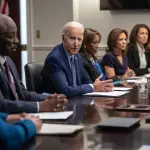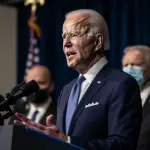Kamala Harris recently showcased her ability to dazzle in a manner that can only be described as “unique” during an interview about the war in Ukraine. When asked about what victory would look like for the Biden-Harris administration in this ongoing conflict, her answer came off as a mix between a political science thesis and a game of word bingo. The incoherence of her response was almost impressive, leading many to wonder if she would have better luck communicating with a Magic 8-Ball.
This situation is hardly surprising, considering the timeline since the Biden-Harris duo took office. With the administration’s friendly invitations to NATO for Ukraine—an invitation that Russia clearly saw as a flashing red warning signal—the stage was set for the conflict. Russia’s invasion was a direct response to the perceived expansion of NATO at its doorstep, something the current administration has yet to navigate with any semblance of effectiveness. As Ukrainians continue to be drafted into military service and perish on the battlefield, it appears clear that the Biden-Harris administration is somewhat reluctant to engage in constructive dialogue with President Putin. Meanwhile, President Biden’s remarks about Putin in 2022—saying he cannot remain in power—did little to calm the waters.
Unscripted: Kamala Harris Gives Rambling, Incoherent Answer on How to End War in Ukraine
https://t.co/R3vD65kIZc pic.twitter.com/WzDjqf7Oy4
— FutureTrump2️⃣⏺2️⃣4⃣🍊 (@RealTrump2020_) October 8, 2024
In an interview that could have been scripted by a chaotic writing room, Harris stumbled through questions posed by CBS, leaving viewers to wonder if it was her first day on the job. She suggested that success in Ukraine hinges on the participation of both Ukraine and the UN Charter in defining what that success might entail. The lack of clarity on this objective reflects the administration’s broader struggle to outline a coherent foreign policy—unless, of course, it involves sending billions of taxpayer dollars to Ukraine.
When pressed on whether she would meet bilaterally with Putin, Harris repeated the mantra of Ukrainian sovereignty, once again elevating rhetoric over genuine diplomatic efforts. Instead of engaging directly with the main player in the conflict, Harris seemed more interested in slogans than solutions. Her responses were typical of an administration that excels at buzzwords but falters at building a structured approach to international relationships.
In stark contrast to Harris’s vagueness, former President Donald Trump has laid out a more straightforward plan. He has confidently stated that if re-elected, he would work to end the war, emphasizing the unnecessary loss of life and destruction. Trump’s recent meeting with Ukrainian President Volodymyr Zelensky reflected a proactive approach—one that includes discussing concrete steps towards resolution and prioritizing a “just peace” for the region.
While Zelensky praised his meeting with Trump as “very productive,” it becomes evident that leadership is measured in actions and results, not just rhetoric. With the administration’s current track record, America can’t help but wonder if a Trump presidency would bring about a swifter resolution to this tragic conflict. The contrast between the two styles couldn’t be clearer: one seeks negotiation and resolution, while the other flounders in a sea of vague promises and indecision.




